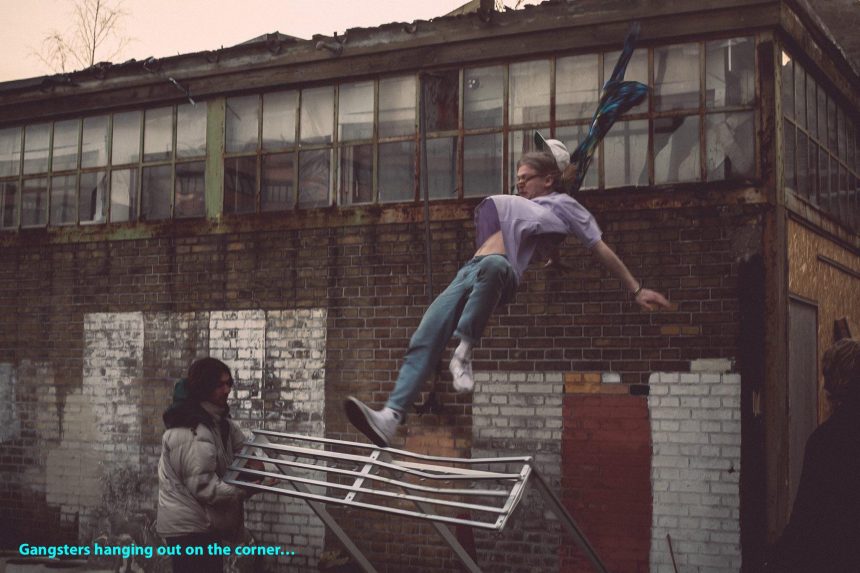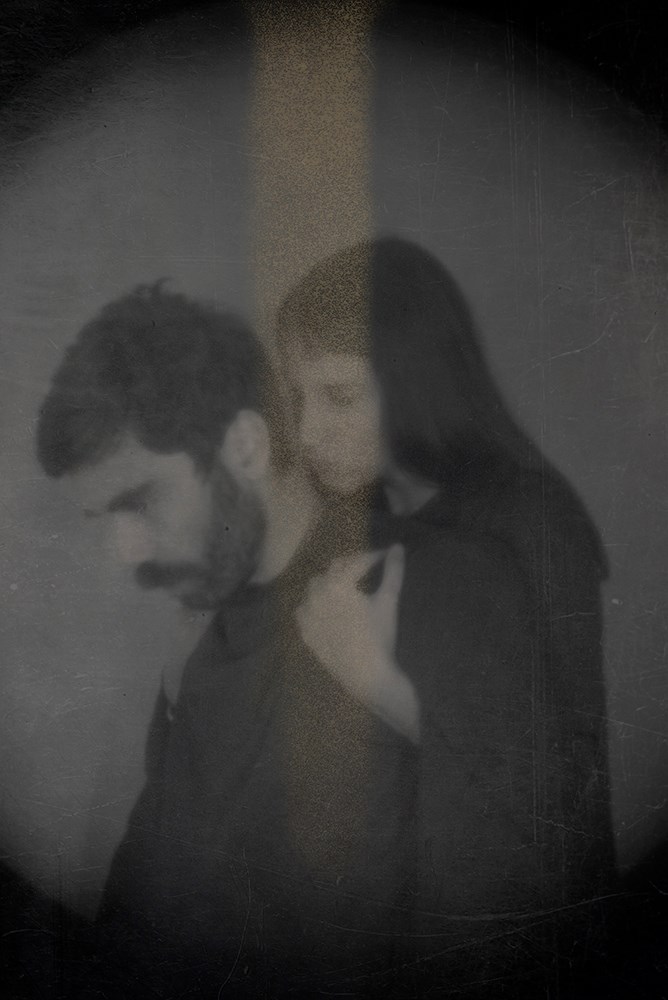Collider – A debut that brings energy back to shoegaze

Collider: “-><-” (Escho, 2019) — Reviewed by Macon Holt. Photo by Veronika.
There have been countless reissues of My Bloody Valentine’s “Loveless” since 1991. And with every one of them, I am stunned at how weak the drums sound on one of my favorite records of all time. This is something Collider could not afford to mess up on their debut record, “-><-”, because, while the influence of the shoegaze pioneers saturates this record, the band have a clear fascination with the kind of dramatic rhythmic technicality that requires percussive clarity. For the stripped back punk bands that usually deploy this feature, that’s ok because a sparser soundscape affords plenty of space for such production. But to achieve this kind of rhythmic dynamism with dense washes of guitar noise is a challenge. To my relief, Collider managed to pull this off. So first off, kudos the record’s producer, Jens Aagaard.
That said, the walls of sound deployed on this record aren’t the main site of musical discovery for Collider that they are for Kevin Shields. Instead, as the band’s name would suggest, it is the collision of these elements with punk phrasing that’s so jerky it seems to shake off pretention, dissonant riffs reminiscent of Sonic Youth, and some kind of oddly ethereal mysticism.
The opening track “Daisy” is this ecstatic cacophony that seems to be pulling itself apart as excitement draws it in every direction at once. That it manages to hold itself together, while retaining this energy, is a testament to the kind of complexity Collider are capable of. I am, however, utterly ambivalent about the use of “rock flute”. I can’t say exactly if this is for aesthetic reasons or just a personal tick. Some kind of scar of memory from having once seen footage of the flautist from Jethro Tull hoping around the stage dressed in faux-medieval garb while delivering a solo. Real or imagined, it still haunts me. Horrifying.
The next track “Just start it” has this nice dissonate riffy vibe reminiscent of early Sonic Youth; a reference cemented by these use of extended guitar techniques throughout the track. But rather being so bogged down in the kind of self-importance that dogged later SY, there are moments of exuberance on this track that have more in common with the joyful naivety found in bands like Johnny Foreigner, such as the vocal melody in the refrain.
After this, we are into the odyssey portion of the album with two tracks that both run at over six minutes long, “Inept” and “Oblivion”. These two don’t quite manage to retain the energy of the album openers. In the case of “Inept”, this is a bit of problem. The track seems to be a little overwrought by the constant expository logic of having to introduce so many new ideas to keep things fresh, while also having to return to them to give the song some consistency. There is not enough time to know where you are with this many fragments, but too much time be ok with that. However, I’d say this drop in energy gives “Oblivion” the space it needs to really open Collider up and begin to reconfigure what they can do. This track is the first chance on the record for us to hear the band working with sparsity as a technique, and they get a lot out it. When a band can be as technical and cacophonous as Collider, if they drop things back, it can create a lot of interesting tension. This is perfect preparation for the second side, which on the whole make great use of this capacity.
“Glockster” starts this side by trying a bunch of new things; A post-punk phrase that then gets boosted into proto-punk pace, to be shaken off for jangle pop, to be replaced by something more like a post-hardcore riff, then more jangle, and a then a lot more flute. This one doesn’t quite add up.
“Sniper” though… “Sniper” is just great. The howl from vocalist (though I’m not really sure of everyone role in this band) Marie Nyhus lets us know this track is going to do something different. It’s actually more exhilarating, after so much euphoria, to have something a little darker played with the same amount of energy. The interplay of Nyhus’ and the male vocals (I mean there are three guys and no personnel list I can find for who did what) give this track so much tension and also allows them to explore a different set of sonic references. There are moments that bring to mind “Devil and God…” era Brand New and, more exciting, a smattering of sounds suggestive of oddities heard in the work of Autolux.
There are more smatterings of that weirdness in the choppy opening of “Axis Fall”, which unfortunately kind of dies back to being a pretty passable shoegaze track. But then “DG” raises the bar again. The strained male vocal in the opening reintroduces stakes to what we are hearing and the track becomes a race to deliver on them. The noise of the breakdown, too, works really well in demonstrating the underside of the fragile balance which gives Collider’s work it’s exuberant emotional resonance. This track is a thrill.
The albums closer “Bruno” is a standout moment. And I say this not having been aware of its demo release two years previously. Which is to say, with no bias of familiarity. There is something about this track, maybe the insistence of the strumming dives it, which may be what provides the cohesive structure; maybe the way it wears its aesthetic references on its sleeve so as to objectify them and not let them dominate it. Suffice to say, there is a melodic, harmonic and timbral seamlessness with which the sections change and the track develops. Similar to “Oblivion”, “Bruno” seems to clear a space for itself and its ideas but in a way that allows Collider to reconfigure what Collider can be. Even after the previous 40-some minutes of listening they still have new places to explore.
Collider sounds like a band who are trying to capture something that has largely disappeared: guitar music that can engender a sense of the possible without being bogged down in the self-importance of its own mission. “-><-” is a record that is rushing to show the world what it can do, and the excitement it carries with this intention is infectious. However, as with rushing to do anything, there are times when Collider falter on this album, but it is never due to them overreaching. When things don’t work, it is usually because they are being too faithful to what has come before: Trying to hide references as their own authentic expression. “-><-” is at its most exciting when it breaks these formulae and finds new uses for them. “-><-” is an incredibly promising debut, the successes of which greatly outshine its shortcomings. The question for the future is rather; can they tame their influences enough to let their ingenuity shine through?
Info: “-><-” will be released February 8th. The release party will feature a number of undisclosed artists (RSVP).



